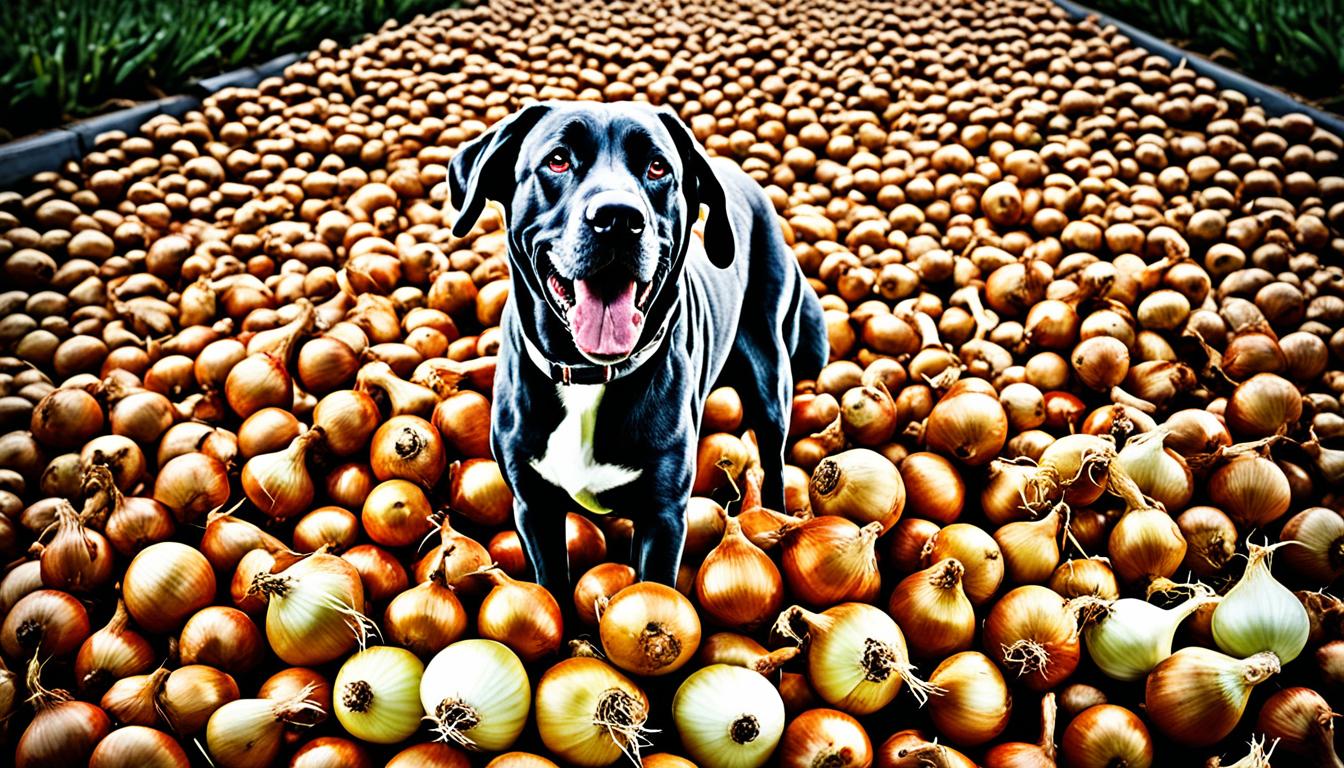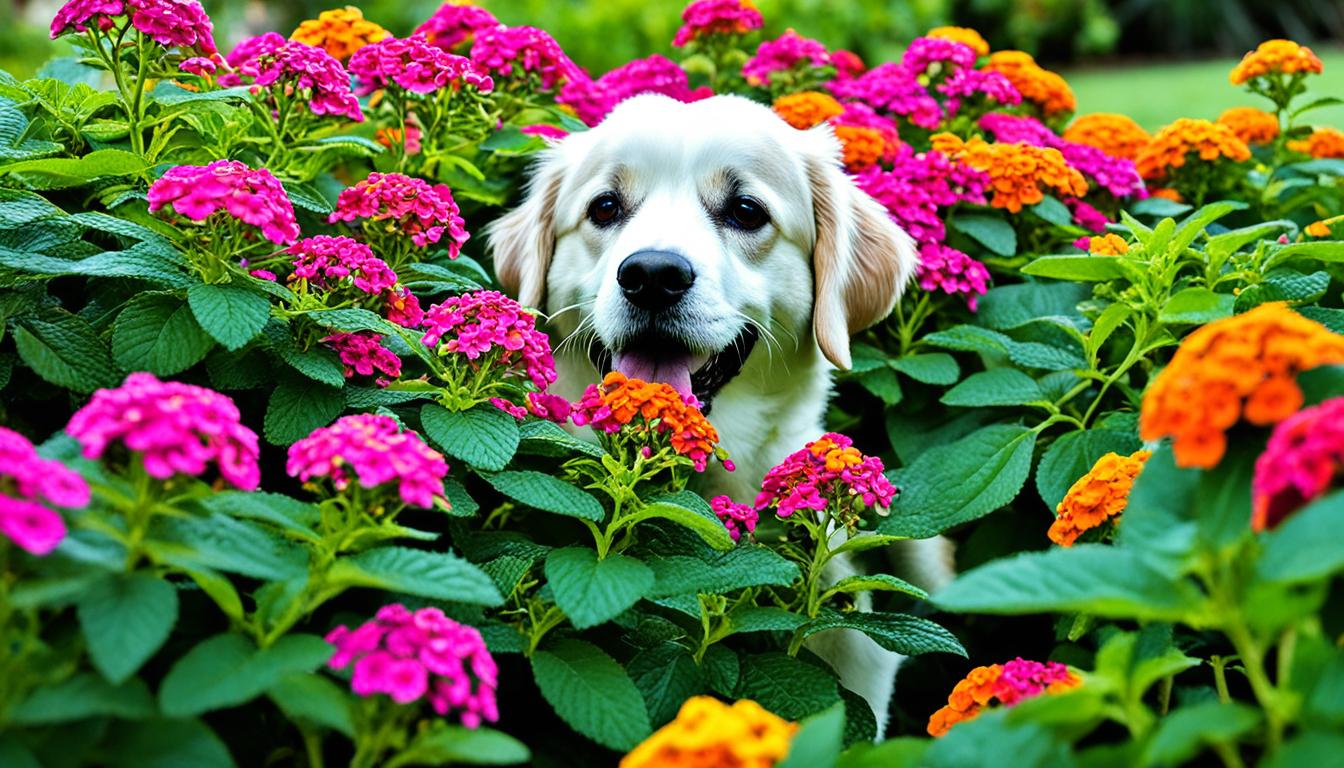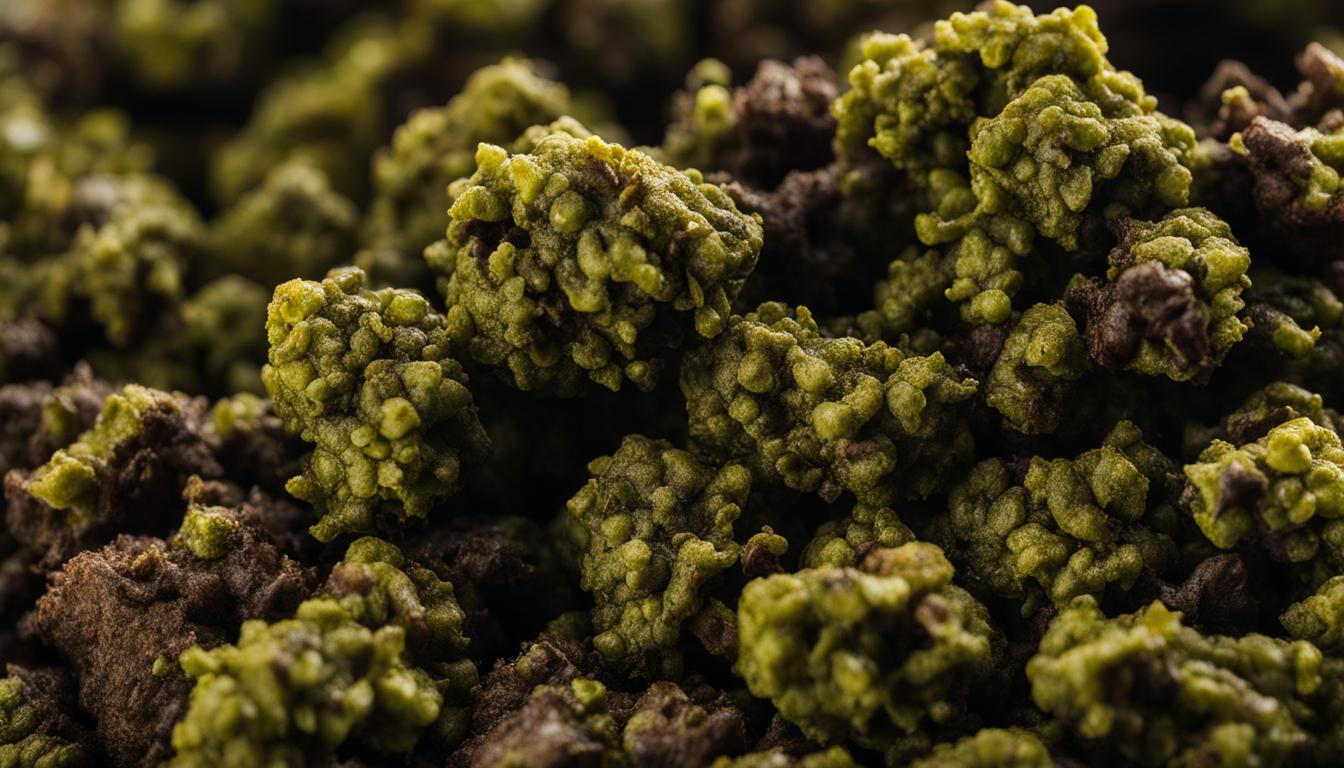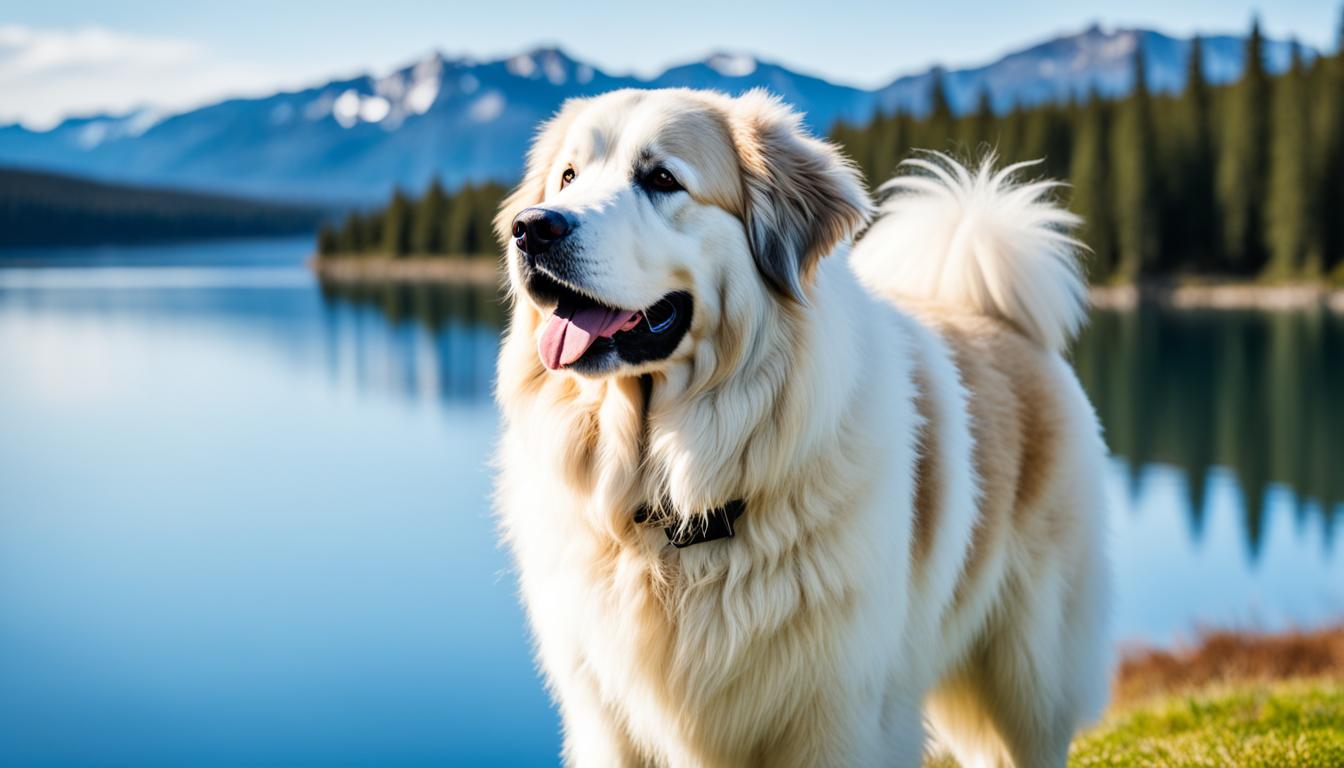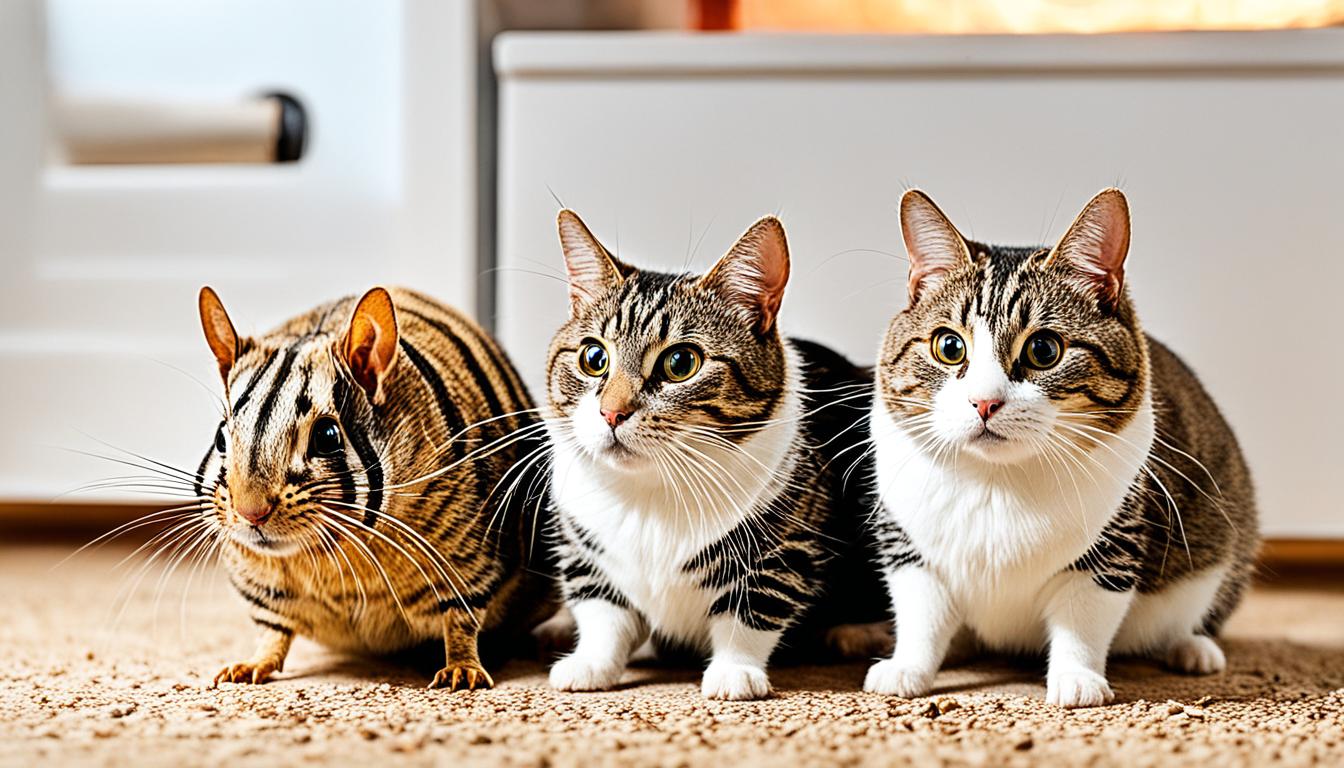Did you know onions can hurt dogs? They contain something called N-propyl disulfide. This thing breaks down red blood cells and makes dogs sick with anemia.
It’s not just the onion’s inside that’s bad for dogs. Every part of it is dangerous. That includes the leaves, juice, and even the powder. A single onion can really harm a dog.
If your dog eats onions, you must watch for signs. Look for vomiting, a fast heartbeat, and lots of panting. These are warnings of onion poisoning.
What to do if a dog eats onions? Take them to the vet. The vet might make the dog throw up to get rid of the onions. They also help make new red blood cells. In bad cases, the dog may need new blood.
Keep dogs safe by keeping onions away from them. That means watch out for onions in human food too. But don’t worry! There are many veggies dogs can enjoy.
Key Takeaways:
- Onions are toxic to dogs due to the compound N-propyl disulfide, which causes the breakdown of red blood cells.
- All parts of the onion plant, including the flesh, leaves, juice, and processed powders, are toxic to dogs.
- One medium-to-large onion can be dangerous for a dog to consume.
- Symptoms of onion toxicity in dogs include anemia, vomiting, elevated heart rate, and panting.
- Treatment for onion toxicity involves veterinary attention, inducing vomiting, and supportive care.
Why Onions are Toxic to Dogs
Onions are common in our kitchens. But, did you know they are toxic to dogs? A compound called N-propyl disulfide is the reason. It can harm our furry friends a lot.
Dogs shouldn’t eat any part of the onion. This includes the flesh, leaves, juice, and powder. Even tiny amounts can be harmful. It’s important to stop dogs from eating onions.
The compound in onions damages dogs’ red blood cells. This damage causes the cells to break down. The result is anemia. Anemia means not having enough healthy red blood cells. This leads to weakness and tiredness.
All onion forms are toxic to dogs. It doesn’t matter if it’s raw, cooked, powdered, or dried. Even onion powder in some foods is very toxic.
We must prevent onion poisoning in dogs. Keep onions and onion dishes out of their reach. Always check food labels for hidden onion to keep your dog safe.
“Dogs should never consume any part of the onion plant, including the flesh, leaves, juice, and processed powders.”
If you think your dog ate onions, get vet help right away. Acting fast is key for your pet’s health.
The Dangers of Onion Toxicity in Dogs
Onion poisoning in dogs is serious. It can even be life-threatening. Signs of onion toxicity include:
- Vomiting
- Diarrhea
- Weakness
- Loss of appetite
- Abdominal pain
- Elevated heart rate
- Panting
If your dog shows any signs or ate onions, see a vet. The vet will check your dog’s health and give the right treatment.
Symptoms of Onion Toxicity in Dogs
Onion toxicity in dogs can lead to various symptoms. It’s key for pet owners to recognize these signs early. This helps in getting quick help from a vet for your pet’s health. Here are the symptoms of onion poisoning in dogs:
Anemia
Anemia is a main sign of onion toxicity. Onions have a compound that breaks down red blood cells in dogs. This results in fewer healthy red blood cells and anemia. Anemic dogs may seem weak, have pale gums, and feel tired.
Vomiting and Gastrointestinal Upset
Dogs that eat onions might throw up and feel sick in their stomach. This includes feeling nauseous, belly pain, and having diarrhea. If your dog eats onions, watch for these signs of stomach upset.
Elevated Heart Rate and Panting
Onion poisoning can make a dog’s heart beat fast and cause heavy breathing. The onion’s effect on red blood cells can stress the heart. If your dog shows these signs, get vet help right away.
The seriousness of symptoms depends on how much onion the dog ate and how sensitive they are. Some dogs might have mild symptoms. Others might have more serious ones. But, any sign of onion poisoning is serious, and you should see a vet quickly.
“If you suspect your dog has ingested onions and is showing any of these symptoms, it is crucial to seek veterinary care immediately. Time is of the essence in treating onion poisoning.”
Even though we’ve listed common symptoms, every dog is different. Some dogs might show other symptoms not mentioned here. If you’re worried about your dog’s health or think they might have onion toxicity, always talk to a vet. They can give the right diagnosis and treatment.
All Parts of Onions are Toxic to Dogs
All parts of the onion plant are harmful to dogs. This includes the flesh, leaves, juice, and processed powders. Dogs should not eat any part of the onion in any form. Even onion leaves are dangerous, the same as the rest of the plant.
To keep your dog safe, make sure food with onions is out of reach. Be careful when cooking with onions. Always check the ingredients in packaged foods. Onion powder and other ingredients from onions might be in them.
Keeping onions away from dogs can protect them. Even a little onion can hurt dogs. It’s best to be careful for their safety.
Onion Toxicity Treatment for Dogs
If your dog eats onions, see a vet quickly to help them recover well. A vet might make the dog vomit to get the onion out. This stops more toxins from getting in.
Helping the dog heal is key in fixing onion poisoning. Vet support helps the dog make new, healthy blood cells. They might use treatments that boost blood cell making.
In bad onion poisoning cases, a dog may need new blood. A blood transfusion can make them healthier. Whether this is needed depends on the poisoning level and the dog’s health.
Seeing a vet fast for onion poisoning is very important. Acting quickly makes beating onion poisoning more likely. Only skilled vets can give the care and support needed for recovery.
Other Vegetables Safe for Dogs
Onions are bad for dogs. But, many other veggies are good for them. Adding these veggies to their diet is both healthy and tasty. Some veggies dogs can eat in small amounts are:
- Carrots
- Cucumbers
- Green beans
Carrots have lots of vitamins, minerals, and fiber. They don’t have many calories. Dogs can eat them raw or cooked and enjoy their crunch.
Cucumbers keep dogs cool and hydrated, perfect for summer. They have few calories but lots of water. This helps keep your dog’s coat shiny and healthy.
Green beans are full of nutrients and fiber. You can give them to your dog raw or steamed. They’re a crunchy, healthy part of your dog’s diet, with vitamins A, C, and K.
Remember, give these veggies to dogs in moderation. Too much can upset their stomach. Always check with your vet before changing your dog’s diet.
The Benefits of Incorporating Vegetables Into Your Dog’s Diet
Adding veggies to your dog’s meals is very healthy. They offer many benefits.
“Improved digestion: Vegetables help with digestion and keep the gut healthy.”
“Weight management: Low-calorie veggies help control weight.”
“Nutrient boost: They give your dog important vitamins and minerals.”
“Dental health: Crunchy veggies clean teeth and lower dental problem risks.”
Start with a little bit of new veggies and watch for allergies. Use only dog-safe veggies and avoid bad ones like onions. Healthy veggie snacks make your dog happy and healthy.
| Vegetable | Nutritional Benefits | Preparation Tips |
|---|---|---|
| Carrots | High in vitamin A and fiber | Can be served raw or cooked; sliced or grated |
| Cucumbers | Hydrating and low in calories | Serve fresh, sliced, or diced; remove seeds if necessary |
| Green beans | Rich in vitamins A, C, and K; high in fiber | Steam or serve raw; cut into bite-sized pieces |
The Mechanism of Onion Toxicity in Dogs
Onions have a chemical known as N-propyl disulfide. This chemical is harmful to dogs. It attaches to their red blood cells, causing damage.
The damaged cells become weak and burst. This leads to anemia. With not enough red blood cells, dogs’ organs don’t get enough oxygen. This can be very bad for their health.
Onions are dangerous to dogs because of N-propyl disulfide. This causes the red blood cells to break, leading to anemia. The weakened cells can’t carry enough oxygen.
This lack of oxygen can cause big health problems for dogs.
Here’s how onion toxicity works:
When dogs eat onions, they absorb N-propyl disulfide into their blood. This sticks to their red blood cells and causes stress.
This stress makes bad oxygen pieces that harm the cell wall. Then, the damaged cells burst. This leaves organs with less oxygen, causing anemia and maybe even hurting organs.
The danger depends on how much onion a dog eats and their size. Small dogs are at more risk. But onions are bad for all dogs, no matter their size.
Keep onions away from your dog. This will stop them from accidentally eating them.
Sources:
- https://www.aspca.org/pet-care/animal-poison-control/toxic-and-non-toxic-plants/onion
- https://vcahospitals.com/know-your-pet/onions-and-garlic-poisoning-in-dogs
Dog Breeds at Higher Risk for Onion Toxicity
Some dog breeds, like Akitas and Shiba Inus, face a higher risk for onion toxicity. These dogs may get more harm from N-propyl disulfide in onions. Owners need to avoid giving these breeds onions to prevent health problems.
Onions can seriously harm dogs, causing anemia by breaking down red blood cells. Some breeds, especially Japanese ones like Akitas and Shiba Inus, are more at risk. They’re more sensitive to onion’s harmful effects.
The exact reason these breeds are more sensitive is not fully known. Yet, it might be because of how their bodies handle onion compounds. They might have a harder time getting rid of N-propyl disulfide, making onions more dangerous for them.
People with Akitas and Shiba Inus should be very careful to keep onions away from their pets. This means watching out for raw onions and foods with onion powder too. It helps to read food labels, not give dogs table scraps, and tell others about the onion danger for these breeds.
If you think your dog has eaten onions, get help from a vet right away. Especially for dogs in high-risk breeds. The vet can check your dog, treat them, and watch their blood to avoid more issues.
To keep your dog safe from onion toxicity, prevention is very important. Especially for those breeds that are at a greater risk. Keeping onions away from your dog helps them stay healthy.
Foods Similar to Onions That Are Poisonous to Dogs
Onions are part of the Allium family. This group includes toxic foods for dogs like garlic, shallots, leeks, scallions, and chives. These can hurt a dog’s red blood cells, causing anemia.
Garlic is very harmful to dogs, even in tiny amounts. Shallots, leeks, scallions, and chives are also dangerous. They can cause the same bad effects as onions. Be careful with these when you cook or give dogs human food.
Here is a table showing harmful Allium foods for dogs:
| Food | Potential Harmful Effects |
|---|---|
| Onions | Oxidative damage to red blood cells, leading to anemia |
| Garlic | Oxidative damage to red blood cells, potential for severe health issues in dogs |
| Shallots | Oxidative damage to red blood cells, similar toxic effects as onions |
| Leeks | Oxidative damage to red blood cells, similar toxic effects as onions |
| Scallions | Oxidative damage to red blood cells, similar toxic effects as onions |
| Chives | Oxidative damage to red blood cells, similar toxic effects as onions |
Dangers of Allium Family Foods
These foods from the Allium family can hurt a dog’s red blood cells. This can lead to anemia. Anemia might make dogs weak, tired, and very sick.
The danger from these foods doesn’t just happen right away. Even little bits over time can be very harmful. So, it’s best not to give any Allium foods to dogs. This keeps them safe and healthy.
Preventing Onion Poisoning in Dogs
To keep your furry friend safe, avoid onion toxicity in dogs. Follow simple steps to keep your dog healthy. This helps them avoid the dangers of onions.
1. Be Cautious with Human Foods
Be careful when sharing your food with your dog. Onions hide in foods like sauces and soups. Always check labels for onions or onion powder. Choose foods without onions to protect your dog.
2. Secure Onions and Onion-Containing Dishes
Keep onions out of your dog’s reach. Store them in places your dog can’t get to. This includes all onion forms, even scraps. Being careful with onions lowers the risk of your dog eating them by mistake.
3. Educate Family Members and Guests
Teach your family and guests about onions and dogs. Make sure they don’t feed your dog anything with onions. This helps keep your dog safe.
4. Consider Safe Vegetable Alternatives
Dogs can’t have onions, but other veggies are good. Carrots, cucumbers, and green beans are safe for dogs. These can be treats or part of their meals for extra vitamins.
These steps help keep your dog safe from onions. Even a little onion can hurt your dog. So, it’s best to be very careful.
Diagnosing Onion Poisoning in Dogs
When checking for onion poisoning in dogs, vets look at different things. They think about the dog’s history, check symptoms, and do special tests. This helps them know if a dog has onion poisoning and how to treat it.
History: Telling the vet about the dog’s recent food and any onion exposure is key. This helps figure out why the dog is sick.
Symptoms: Dogs with onion poisoning show signs like anemia and throwing up. They might also have a fast heart rate, breathe fast, feel weak, or have stomach troubles. Finding these signs helps guess if it’s onion poisoning.
Blood Work: Vets might test the dog’s blood to learn more. Onion poisoning changes blood cells because of onion toxins. Finding “Heinz bodies” in the blood also points to onion poisoning.
Kidney Function and Urinalysis: Sometimes, more tests are needed to check the kidneys. This helps see if the kidneys are hurt by the onion poisoning. It makes sure the vet knows exactly what is wrong.
Getting a vet to check your dog right away is super important. They know what tests to do and how to help your dog get better.
Common Symptoms of Onion Poisoning in Dogs
| Symptoms | Description |
|---|---|
| Anemia | Decreased red blood cell count leading to reduced oxygen-carrying capacity. |
| Vomiting | Expelling stomach contents forcefully through the mouth. |
| Elevated Heart Rate | An increased heart rate beyond the normal range. |
| Panting | Rapid, shallow breathing often exhibited by dogs in distress. |
| Weakness | Lack of strength or energy, resulting in decreased activity levels. |
| Gastrointestinal Disturbances | Includes nausea, abdominal pain, and diarrhea. |
The Importance of Prompt Treatment for Onion Toxicity
If your dog eats onions, you need to act fast. Quick actions can help your dog feel better and heal.
Getting your dog to a vet quickly is key. Starting treatment early can stop serious illness and might save your dog’s life. Onions can harm your dog’s health fast, causing anemia.
Think your dog ate onions or is acting sick? Get them to a vet right away. A vet will check your dog, give the right treatment, and watch their health. Remember, even a little bit of onion can hurt, so don’t wait.
FAQ
How poisonous are onions to dogs?
Onions can make dogs very sick. They have a compound that breaks down dog’s red blood cells. This can lead to anemia.
What are the dangers of onions for dogs?
Eating onions can hurt dogs’ red blood cells. This can make them have anemia and harm their organs.
Can dogs eat onions?
No, dogs should avoid every part of the onion. This includes the flesh, leaves, juice, and powders.
What are the signs of onion poisoning in dogs?
Signs include anemia, vomiting, fast heart rate, and heavy breathing.
What parts of onions are toxic to dogs?
Every part of the onion is bad for dogs. This means the flesh, leaves, juice, and any powders.
Can dogs eat onion leaves?
No, onion leaves are harmful like the rest of the plant. Dogs should not eat them.
How do you treat onion poisoning in dogs?
If a dog eats onions, they need a vet right away. They might need to throw up. They will get care to help them feel better.
What other vegetables are safe for dogs to eat?
Dogs can safely eat carrots, cucumbers, and green beans. But only give them a little bit.
How do onions poison dogs?
Onions have something called N-propyl disulfide. It hurts dogs’ red blood cells and causes anemia.
Are there dog breeds at higher risk for onion toxicity?
Yes, some dogs like Akitas and Shiba Inus can get sicker from onions.
What foods are similar to onions that are poisonous to dogs?
Foods like garlic, shallots, leeks, scallions, and chives are also bad for dogs. They’re all in the same family as onions.
How can I prevent onion poisoning in dogs?
Keep onions and foods with onions away from dogs. This can stop them from getting sick.
How is onion poisoning in dogs diagnosed?
Vets find onion poisoning by looking at what the dog ate, their symptoms, and blood tests.
Why is prompt treatment important for onion toxicity in dogs?
Quick treatment helps avoid serious problems. It can save a dog’s life.
